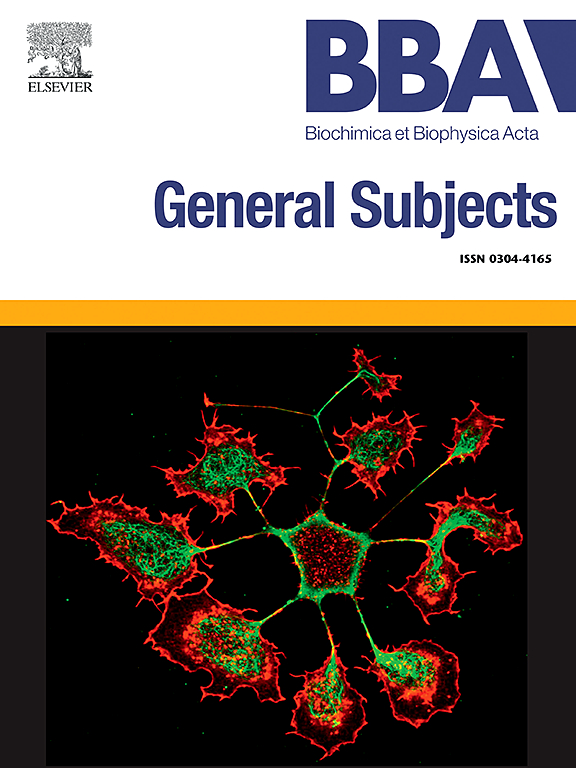The role of tumor-associated fibroblast-derived exosomes in chemotherapy resistance of colorectal cancer and its application prospect
IF 2.2
3区 生物学
Q3 BIOCHEMISTRY & MOLECULAR BIOLOGY
Biochimica et biophysica acta. General subjects
Pub Date : 2025-03-21
DOI:10.1016/j.bbagen.2025.130796
引用次数: 0
Abstract
Colorectal cancer (CRC) is the second most common malignant tumor in the world. With its increasing incidence and younger age trend, its impact on human health has been paid more and more attention. Currently, we have a variety of chemotherapy drugs that can be used to treat colorectal cancer. However, the drug resistance of colorectal cancer has become a significant factor affecting its cure rate. Some studies have reported that exosomes are related to the occurrence of drug resistance. However, the exact mechanism is not precise. Therefore, we focused on the role of cancer associated-fibroblast-derived (CAFs-derived) exosomes in colorectal progression. It was found that cancer cells transmit information through exosome interaction and induce chemotherapy resistance by promoting epithelial-mesenchymal transition (EMT), up-regulating the Wnt/β-catenin signaling pathway, transforming growth factor-β1 (TGF-β1) pathway, promoting angiogenesis and other possible molecular mechanisms. In addition, in terms of clinical significance and therapeutic strategies, we explore the clinical relevance of CAFs-derived exosomes in colorectal cancer patients and their potential as potential biomarkers for predicting chemotherapy response. We also provide a new possible direction for overcoming chemotherapy resistance in colorectal cancer by targeting CAFs-derived exosomes.
肿瘤相关成纤维细胞衍生外泌体在结直肠癌化疗耐药中的作用及其应用前景。
结直肠癌(CRC)是世界上第二常见的恶性肿瘤。随着发病率的上升和低龄化趋势,其对人体健康的影响越来越受到重视。目前,我们有多种化疗药物可用于治疗结直肠癌。然而,结直肠癌的耐药已成为影响其治愈率的重要因素。一些研究报道外泌体与耐药的发生有关。然而,确切的机制并不精确。因此,我们关注癌症相关成纤维细胞衍生(cafs衍生)外泌体在结直肠癌进展中的作用。发现癌细胞通过外泌体相互作用传递信息,通过促进上皮-间质转化(EMT)、上调Wnt/β-catenin信号通路、转化生长因子-β1 (TGF-β1)通路、促进血管生成等可能的分子机制诱导化疗耐药。此外,在临床意义和治疗策略方面,我们探讨了cafs来源的外泌体在结直肠癌患者中的临床相关性以及它们作为预测化疗反应的潜在生物标志物的潜力。我们也为通过靶向cafs来源的外泌体克服结直肠癌化疗耐药提供了新的可能方向。
本文章由计算机程序翻译,如有差异,请以英文原文为准。
求助全文
约1分钟内获得全文
求助全文
来源期刊

Biochimica et biophysica acta. General subjects
生物-生化与分子生物学
CiteScore
6.40
自引率
0.00%
发文量
139
审稿时长
30 days
期刊介绍:
BBA General Subjects accepts for submission either original, hypothesis-driven studies or reviews covering subjects in biochemistry and biophysics that are considered to have general interest for a wide audience. Manuscripts with interdisciplinary approaches are especially encouraged.
 求助内容:
求助内容: 应助结果提醒方式:
应助结果提醒方式:


